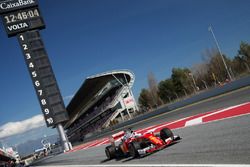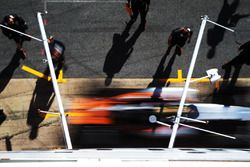Analysis: New Austin deal delivers Formula 1 engine bonus
This week's confirmation that the United States Grand Prix deal is done for 2016 has delivered an extra boost to Formula 1 teams, beyond just the positive news of a race in one of the world's biggest markets.

Photo by: Red Bull Content Pool













For thanks to the detailed wording of F1's Sporting Regulations, removing the uncertainty about Austin on the eve of the new season will mean teams are on course to get another engine for the season ahead.
Four engine limit
F1 had long been set on a plan to reduce power unit usage over the duration of the turbo hybrid era.
Having originally started with five power units for the first year with the new engines in 2014, the rules allowed teams to use just four power units from last season.
However, on the back of struggles that Honda faced in its first year, a mid-season rule change meant new manufacturers would be given an extra unit for their debut campaigns.
The four engine plan fitted perfectly with a 20-race schedule, but it was clear that stretching the units if the calendar expanded would perhaps be a step too far.
That is why from the off, there was always a concession in the regulations that if there were more than 20 races then an extra engine would be allowed.
Korea conundrum
Back in December 2014, the surprise inclusion of the Korean Grand Prix on a late 2015 21-race provisional calendar prompted speculation of a secret plan by Bernie Ecclestone to give teams a fifth engine.
It related to the original wording of the sporting regulations that stated: "This number [of engines] will be increased to five if the number of Events in the Championship, as originally scheduled, exceeds 20."
Korea's presence in a late draft of the calendar did not budge the FIA though on its stance that the first engine limit stood.
For its view was that the 'original' 20-race provisional calendar was the one that would be taken in to account, meaning four engines whatever the fate of the extra race.
In light of that situation, the rules regarding the number of engines was subsequently revised to make it clear that what mattered going forward was the state of the calendar when the season actually began.
Article 23.4 c) of F1's Sporting Regulations now states that the limit of four engines will: "be increased by one if the number of Events, as scheduled at the start of the first Event of the Championship, exceeds 20."
Australian confirmation
With the official classification of an Event beginning with final free practice, it means that on Saturday morning in Australia there will be 100 percent confirmation that it is five engines this year.
However, with there being no immediate doubt about other events – and Austin now having its future sorted – there is almost no chance of there being a change of plans within the next week.
Strategic options
Teams have so far been planning their equipment on the prospect of using four engines, so the addition of a fifth will open up some tactical options.
Some may choose to spread their mileage throughout the campaign, some may elect to hold back on the fifth as an end-of-season special, or some may simply stick to four and keep hold of the fifth as an emergency measure.
Mercedes engine boss Andy Cowell said at pre-season testing. "Our plans were all based on their being 20 races and there being four power units.
"Depending how the next two or three weeks go, it will determine how aggressive we are with running from Melbourne onwards.
"That will determine if we plan to use just four, and have that bonus engine which might help us out if we have a quality issue. Or it might help us out if we want to play a performance special.
"But we will work all that out in the days before Melbourne."
Be part of Motorsport community
Join the conversationShare Or Save This Story
Subscribe and access Motorsport.com with your ad-blocker.
From Formula 1 to MotoGP we report straight from the paddock because we love our sport, just like you. In order to keep delivering our expert journalism, our website uses advertising. Still, we want to give you the opportunity to enjoy an ad-free and tracker-free website and to continue using your adblocker.















Top Comments